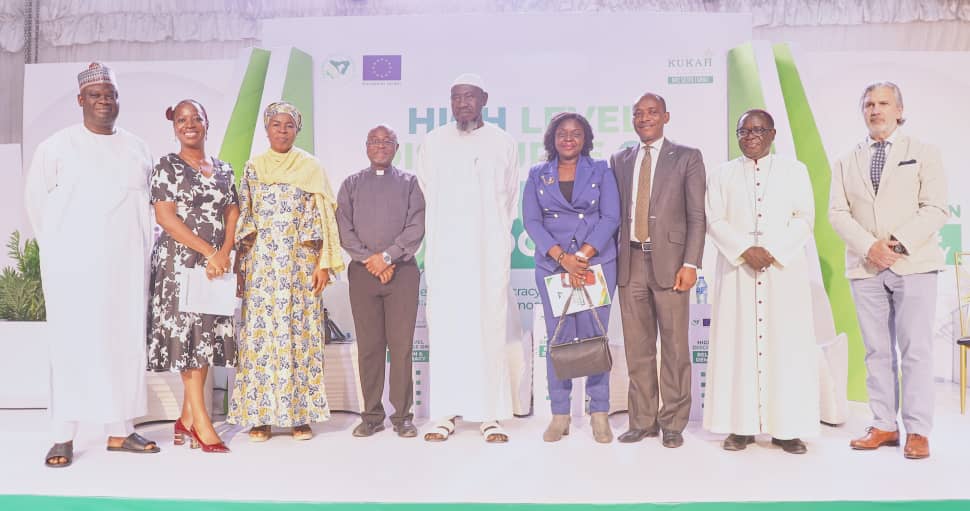Religious leaders, critical pillars in sustaining Nigeria’s democracy-Akpabio, Kukah
By Angela Atabo/Emmanuel Olorniruha
Senate President Godswill Akpabio and the Catholic Archbishop of Sokoto Diocese, Rev. Matthew Kukah, have called on religious leaders to provide the necessary moral guidance for the sustenance of Nigeria’s democracy.
They made the call at the National Peace Committee High Level Discourse on Religion and Democracy organised by The Kukah Centre, with support from the European Union, on Tuesday in Abuja.
According to Akpabio who was represented by Sen. Adams Oshiomole, religious leaders have a critical role to play in promoting democratic values and principles providing the necessary guardrails of conduct to ensure democracy thrives.
“Religion has the power to be a tremendous force for good.It can unite us, fostering understanding and respect among our diverse communities.
“Too often we have seen religion misused as a tool for division and strife, the dangers posed by violence and intolerance threatens to undermine our democratic values and the principles that hold our society together.
“We cannot ignore the pain and suffering caused by religious conflict in the world, pain that disrupts lives, tears apart families, and stifles progress.
“As Mahatma Gandhi wisely said, quote, an eye for an eye only end up making the whole world blind. We must remember this truth as we seek to break the cycle of violence.”
Akpabio said it was essential for government officials, religious leaders, civil society members, and every Nigerian to heed the urgent call from the National Peace Committee on peaceful co-existence rooted in mutual respect and understanding.
Also speaking, The European Union Ambassador-designate to Nigeria, Gautier Mignot, said the EU is keenly supporting freedom of religion and belief, both globally and at national levels.
“EU supports democracy through a flagship programme called Support for Democratic Governance in Nigeria, implemented in collaboration with various organisations.
“It focuses on building strong, effective and legitimate democratic institutions, complementing the efforts of the Nigerian government and people to improve and strengthen democracy. “
Mignot added that in Nigeria, the EU promotes freedom of religion and belief through support for efforts to create an environment where everyone would practice their religion freely without fear of persecution.
The Speaker of the House of Representatives, Tajudeen Abbas, condemned faith-based organisations that often play perverted roles in mobilising citizens toward social justice initiatives and humanitarian efforts.
Abbas, who was represented by the Majority Leader, Julius Ihonvbere, said when political leaders exploit religious sentiments for electoral gain, or when religious institutions engage directly in partisan politics, it threatens democracy.
“The intertwining of religion and politics often complicates governance and can lead to polarisation among our citizens. It is crucial that we recognise these dynamics as we strive for a more inclusive democracy.”
“One of the primary challenges facing our democracy is the politicisation of religion.”
Abbas said by advocating for peace-building initiatives and encouraging dialogue among different faiths, religious leaders could help build bridges that divided and threatened Nigeria’s democratic fabric.
Contributing, Kukah, said that religion was not the problem but the malfunctioning state that increasingly relied on religion to fill gaps in governance.
He stressed that both christians and muslims in Nigeria face distorted interpretations of religion, which complicates efforts to achieve a true democratic space.
“Our conversation today is aimed at just looking at the intersection between religion and democracy.
“In reality, when you look at the kind of indicators and what democracy ought to be able to deliver, there is a correlation between that and the need for us to have a moral foundation on which to build some of these principles.
“Yet we know that, in the name of democracy, Nigerians are dying daily. In the name of religion, Nigerians are dying daily.
“So, something must be wrong. The challenge for us is to try and find that nexus.”
Kukah said that chapter two of the Nigerian constitution talked about all the security and protection that the Nigerian state is supposed to give to citizens.
He urged the state to step to its responsibility of protecting citizens, to end religious and political killings.
Also speaking, His Royal Majesty,Dr Daniel Ismaila ,Hama ,Bachama, called for the need to put in place early warning signs to avert religious conflicts.
Ismaila also called for synergy among stakeholders to continuously create awareness on the need for peace because without peace everything would be grounded in Nigeria.
He advocated mechanism to be put in place for the rule of law to be strictly adhered to, and to always punish perpetuators of violence to serve as deterrence to others.
In his goodwill message, the Emir of Keffi, Dr Shehu Yamusa III, called on religious leaders to educate the people on the importance of democratic principles, good governance, religious tolerance and public accountability.
Yamusa said that this would aid in addressing election-related issues and other challenges facing the country(NAN)(www.nannews.ng)
edited by Sadiya Hamza





